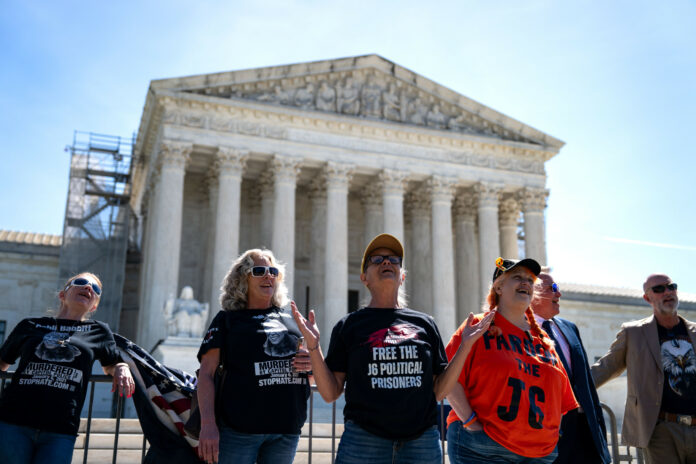The Supreme Court’s conservative majority has signaled that it may be preparing to upend hundreds of criminal charges against participants in the January 6 attack on the U.S. Capitol.
Over 300 January 6 defendants have faced the federal felony charge “obstructing an official proceeding,” resulting in many convictions and prison sentences. The statute was passed by Congress in 2002 following the Enron scandal. It mandates a prison sentence of up to 20 years for those who “corruptly” attempt to obstruct, influence or impede evidence or “any official proceeding.”
Supporters of former President Donald Trump were accused of the obstruction charge after storming the Capitol in an ill-fated attempt to disrupt the joint session of Congress on January 6, an “official proceeding” to certify President Joe Biden’s 2020 election victory.
Oral arguments for Capitol attack defendant Joseph Fischer’s appeal of the charge were heard in the Supreme Court on Tuesday. Fischer’s attorney Jeffrey Green argued that the charge should not apply to his client because the statute was enacted over the destruction of evidence related to financial crimes.
Kent Nishimura
Green maintained that the law has more to do with altering documents than events like January 6, telling the justices that “attempting to stop a vote count or something like that is a very different act than actually changing a document or altering a document or creating a fake new document.”
The court’s conservative justices appeared to be mostly sympathetic, with some expressing concerns that the law could be used against protesters or hecklers and suggesting that the Department of Justice (DOJ) may have gone too far by applying the statute to the Capitol attack.
While conceding that the Capitol attack was “very serious,” conservative Justice Samuel Alito drew parallels between the January 6 defendants and Monday’s pro-Palestinian protests that blocked traffic in several major cities, asking U.S. Solicitor General Elizabeth Prelogar whether the charge would apply for similar protesters.
“What if something similar to that happened all around the Capitol so that members—all the bridges from Virginia were blocked, and members from Virginia who needed to appear at a hearing couldn’t get there or were delayed in getting there?” Alito asked. “Would that be violation of this provision?”
Fellow conservative Justice Neil Gorsuch raised similar concerns, while also suggesting that the Capitol rioters were akin to protesters.
Gorsuch asked whether the statute would apply to hecklers, those participating in “sit-ins” and possibly even Democratic U.S. Representative Jamaal Bowman—who pulled a fire alarm at the Capitol during a House vote last year.
“Would a sit-in that disrupts a trial or access to a federal courthouse qualify?” Gorsuch said. “Would a heckler in today’s audience qualify, or at the State of the Union address? Would pulling a fire alarm before a vote qualify for 20 years in federal prison?”
The court is expected to rule on the case by June. While the conservatives largely hinted that they could be preparing to rule in favor of Fischer, the court’s three liberal justices appeared to be less skeptical of the DOJ applying the charge to January 6 participants.
Journalist Roger Parloff, senior editor for Lawfare, concluded in a post to X, formerly Twitter, that five of the justices—enough for a majority—seemed to be “implacably opposed to DOJ view.”
Newsweek reached out for comment to the DOJ via online press contact form on Tuesday.
If the obstructing an official proceeding charge is overturned by the court, it could be quickly wiped from the records of every January 6 defendant who faced the charge. However, most have also faced other criminal charges to which the ruling would not apply.
Fischer, former officer with the Boston Police Department, has already pleaded guilty to eight other criminal counts, including assaulting a law enforcement officer.
Uncommon Knowledge
Newsweek is committed to challenging conventional wisdom and finding connections in the search for common ground.
Newsweek is committed to challenging conventional wisdom and finding connections in the search for common ground.


